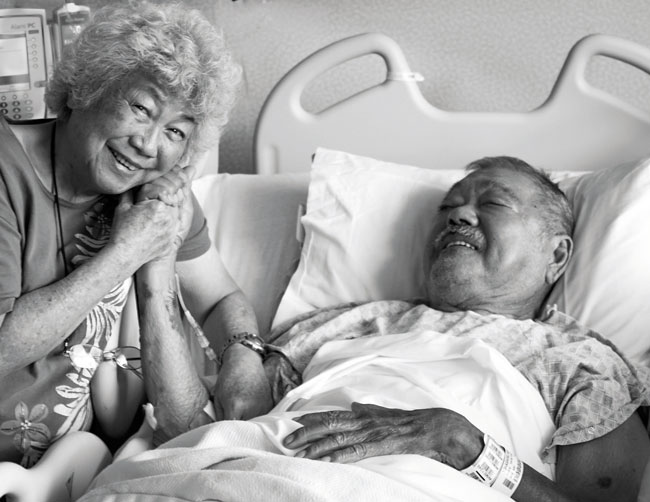Advice Can Save A Loved One’s Life
There are lessons to be learned in all of life’s twists, little and large. For my family, it was this: When one or more of your loved ones is medically fragile, you need to be prepared — and even overprepared — for any emergency.
We learned this lesson the hard way, when my dad had to make a sudden visit to the ER. My brother Scott, luckily, lives with my parents, and he did a fantastic job responding to the emergency. But later he told me he felt crushed by what he didn’t do.

Mom Joyce with Dad Harold in the hospital after a sudden visit to the ER. JADE MOON PHOTO
The paramedics asked for information on what drugs Dad was taking.
All my brother could tell them was: “a lot.” And he showed them.
But they wanted more information. What were these pills?
What were they for?
How often did he take them?
Uh oh.
My father, as some of you may remember, had a kidney transplant about 10 years ago.
The medications he takes fill up a big plastic bag and a supersized pillbox.
My poor brother was at a loss. He couldn’t name all the prescriptions and, let’s be real, who can possibly do that in that kind of situation?
No, he was devastated because he couldn’t find the information right away.
A list of the drugs was stored — in the computer. They found it.
But then they couldn’t print a copy for the paramedics.
Not good.
And I’m not pointing any fingers here. I would have been in the same situation.
As you can see from my photoraph of Mom and Dad smiling in his hospital room, he pulled through and is OK. We’re all smiling with them with relief.
But, as I said, lessons have been learned.
I went to the one with the answers, Shayne Enright, spokeswoman for Honolulu Emergency Services Department. Here’s what she says you need to have readily available if you have elderly or otherwise medically fragile family members.
• A list of medications and why they’re taking them. Paramedics are trained in such knowledge but emphasize it’s best to have all the drugs listed on a piece of paper so they can fill in the ER doctor on their way to the hospital. And — this is important — put it on the refrigerator (paramedics will look there first) or some other easily accessed and visible place, like next to the telephone.
• Have a list of your family member’s doctors and their phone numbers.
• Have a list of emergency contacts paramedics can call. Again, put it on the refrigera- tor or some other easy-to-find place.
Other important tips:
If the patient lives in a secured building, make sure you know the code. It’ll save paramedics precious time when they reach the building. If the patient is breathing and can be left alone for a few minutes, go outside so you can wave them down. Again, a time saver so they don’t have to hunt for the address.
And finally, do not hesitate to call 911 if something is wrong.
“Please,” says Enright, “please call us first before calling other family members.”
Too many people hesitate because they aren’t sure if what’s happening is severe enough. Some may try to take the person to the ER by car.
Don’t.
For one thing, paramedics and ER doctors can treat the patient while en route, something you cannot do.
If it’s a heart attack, a stroke or internal bleeding, etc., time is of the essence. Don’t squander a second.
Some folks hesitate to call an ambulance because they hate to “make a fuss.”
My dad, ever the stoic, belongs in this category.
Ignore them.
Make a fuss.
It’s a cliché, but it’s apt: It’s better to be safe than sorry.





